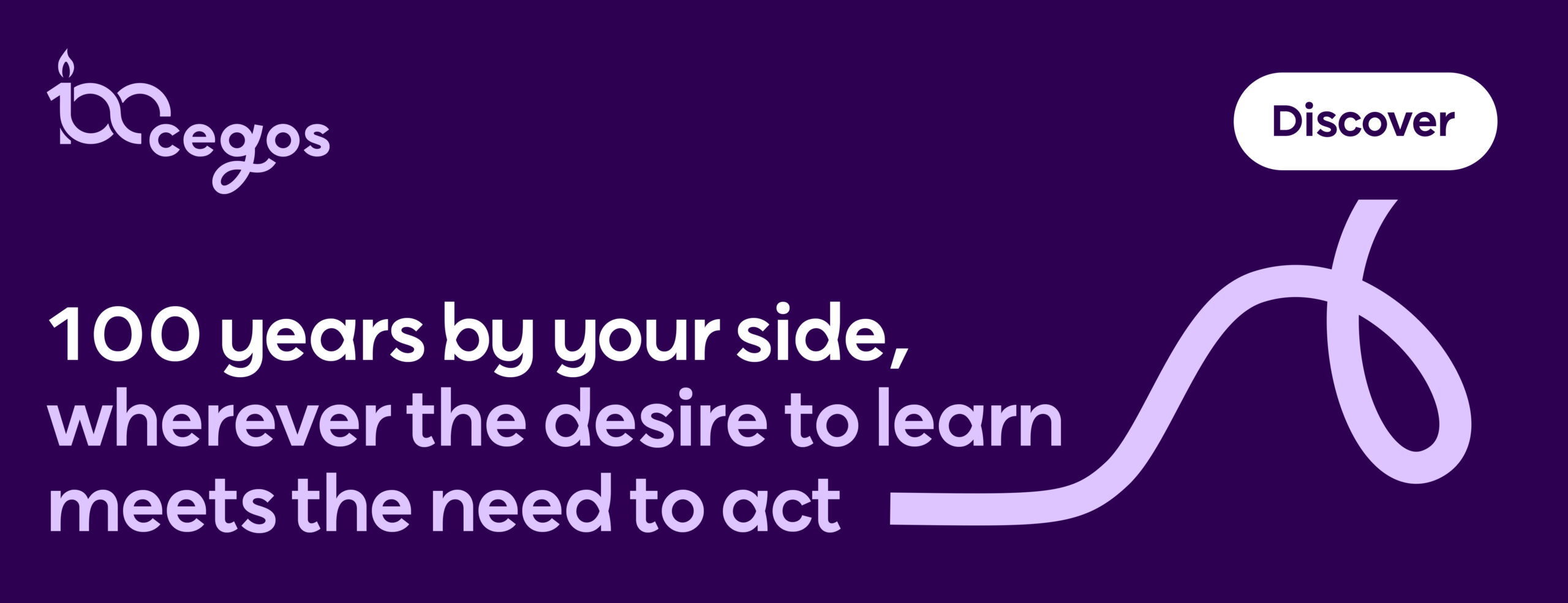
Mag summary
- 1) Preparing Leaders / Leadership pipeline adequately with knowledge and skills they need to navigate the future
- 2) Creating a culture of #innovation
- 3) Organisational mindset and road-map for change
- 4) Transforming the organisation in the digital era (Technology and tools)
- 5) Transforming the organisation in the digital era (The human touch)
- We are a learning organisation, so what are we doing about it?
- Cegos Team
The new decade is fast approaching. The 2020s, the future of work, AI, Robots, disruption, hysterics, cats and dogs living together (I thank you, Dr. Peter Venkman) … you get the picture. The problem? The future is now and many organisations have reached a point where fundamental shift and transformation is a must-do, not a nice to do. With that come bold new thinking, clear vision, broader purpose, (bigger) new budgets and the mobilisation of great people to make it happen. In short, we have to be braver, stronger and most of all prepared to think / do differently.
But how? What are the top focus areas for organisations now? Who is succeeding in this time of shift? Where is the spend and what is being done about it internally to help everyone – from the top down – to unlearn what we knew, relearn new ways and keep learning in the ever changing new era? Here are 5 must-do's essential for the health of our organisations. For some, these represent brave new ways to work, for others they may have already started the journey...

1) Preparing Leaders / Leadership pipeline adequately with knowledge and skills they need to navigate the future
This is about preparing mentality as well as taking the actions, making the decisions that will evolve the organisation and being able to compete effectively in the marketplace. It starts with understanding what is happening out there and how organisations are winning in an ever-shifting business environment. Things like:
- Understanding the future of work and how benchmark companies are succeeding (and how some are failing)
- Transformation of the business in the digital era and the conceptual 'future of work'– What are they? What do we mean? How to execute effectively, while bringing along the rest of the organisation?
- Mobilising skilled resources internally as collaborative teams - that may be operating entirely remotely - empowered to drive new learning, new ways of working, new direction and more
- New skills that close the gap between traditional ‘ivory towers’ and operational connection for leaders. New skills for the rest of the organisation that recognise the state of business evolution, the new competitive landscapes being faced and much more.
Check out this article and podcast from Forbes magazine ‘What does leadership look like in the future of work?’
2) Creating a culture of #innovation
The first step here is understand what we mean by a culture of innovation. In summary, we can define as:
A setting that enables new and creative thinking, linked closely to business direction, shareholder value creation (or similar) through improving and launching bold new products, solutions, services that provide the competitive edge for the organisation and fulfill the evolving needs of our customers.
It starts with learning – educating the organisation leaders and managers in what it is, how to do it and the steps to take to implement innovation. It needs to be at the heart of how the company operates, recognises and rewards.
For more on the topic, read this article from Entrepreneur India online ‘Creating a culture of innovation starts with the leader’
3) Organisational mindset and road-map for change
Transforming organisations in the rapidly evolving workplace we operate in has become a constant. It is fluid and flexible, helping the organisation to more rapidly shift and change with the needs of the market, its customers, its partners and new disruptive competitors. This is as much about protecting our people as much as the business.
On this change journey we need to build an organisation that is attractive to Talent, that retains our performers, builds a strong leadership pipeline and provides an environment for each person to grow and contribute in meaningful ways.
It’s an attitude, a state of organisational mind. With that comes a clearer vision of what change is needed. Clarity is built from the top down through clear communication and this leads to action, acceptance and implementation.
My good friend Laura Goodrich is passionate about this topic. She is at the forefront of a loud call to arms at leader / manager level to build organisations that are more adaptive to change and more agile in change execution. See more here and connect with Laura.
4) Transforming the organisation in the digital era (Technology and tools)
Much is talked about in terms of digital transformation – but even working in a learning organisation, I see little out there that is focused on helping organisations navigate the digital divide – ie what are the new technologies that can better enable the business and its people? What is appropriate technology versus tech that is ‘fashionable’? ie. are we guilty of going for the new fad / fashion rather than function and focus when considering technology. You'd be surprised...
IoT, Big Data, BlockChain, FinTech, AR, VR, MR, AI, Robotics – are all these just words to your organisation? Or are you actively investigating what they are, whether they are appropriate, how you might use them and how to integrate new ways of working, fueled by relevant tech / tools like these?
The interesting thing is that the items above are often ‘discussed’ but you have to look much wider to for where they are ‘taught’. Watch this space! We have solutions coming in 2018 to help our customers in all these areas. Practical, actionable and appropriate. Working on it because we see the need, see the gap and want to do something about it!
For further thoughts and reading, take a look at this Forrester report ‘The digital business imperative’ published earlier this year.
5) Transforming the organisation in the digital era (The human touch)
The secret to success in the digital era? People.
The human heart of our organisations is arguably more important than ever and we need to do more to help our people through the environment of constant change we find ourselves in. Many organisations have become short term as they chase ‘the numbers’ – pressuring their talented contributors to do more with less and deliver more as part of their job scope.
Some more enlightened organisations are actively investing in new ways of working and, with it, new ways of learning that are more personalised, adapted to the new demands of the workplace and future-focused to build skills that prepare our organisation for the way ahead.
If you are interested to know more about the human / digital shift, then watch this Tedx talk by Joel Comm ‘Being human in the digital age’ – it’s 15 minutes well spent.
We are a learning organisation, so what are we doing about it?
Here at Cegos Asia Pacific we are so committed to helping organisations through this change, that we are redefining our workplace learning solutions to target the above (and more) and we have created our 2018 flagship annual industry event around the theme – specifically to share stories from those having been through the journey, to help drive meaningful actions for those starting or still on the road. Watch the video summary of the event and download whitepaper and resources on Cegos APAC's website.
This post was written by Jeremy Blain when he was Regional Managing Director at Cegos Asia Pacific










